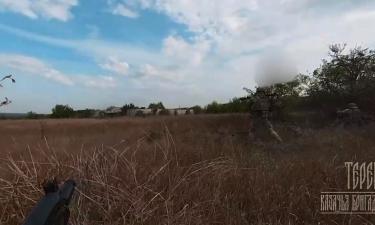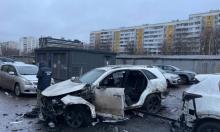Mexico denies soldiers protected drug crossing at U.S. border
Drug traffickers, not Mexican soldiers, were the uniformed men with a military-style Humvee who helped marijuana smugglers escape U.S. arrest by fleeing across the Rio Grande, the Mexican government said Wednesday. Mexicans were hardly surprised, given that criminals regularly masquerade as cops or military officials here. But Americans were shocked when Texas sheriffs' officials showed photos of what appeared to be soldiers in U.S. territory.
Both U.S. and Mexican federal governments say there's no evidence the Mexican military was involved, and Mexican presidential spokesman Ruben Aguilar blamed drug traffickers parading as soldiers.
Nonetheless, U.S. Ambassador to Mexico Tony Garza issued a strongly worded statement late Wednesday in which he asked the Mexican government to "fully investigate" the incident. In Mexico, kidnappers and drug smugglers regularly wear police gear. Caps, vests and T-shirts bearing official-looking logos for Mexico's federal police force are sold at street stands. Some cops even rent out their uniforms or patrol cars to shakedown artists.
"It's very easy to go out and buy military uniforms in a store ... it's very easy to get (uniforms) for any police agency you want to imitate," said Rodolfo Casillas, a professor at the Latin American School for Social Sciences who specializes in crime studies.
Rick Glancey of the Texas Border Sheriffs' Coalition said the confrontation began 50 miles (80 kilometers) east of El Paso when state police tried to stop three sport utility vehicles on Interstate 10. The vehicles made a quick U-turn and headed south toward the border, a few miles away.
Crossing the border, one SUV got stuck in the river, and the men with the Humvee tried in vain to tow it out. Then a group of men in civilian clothes began unloading what appeared to be bundles of marijuana, and torched the SUV before fleeing.
It was another tense confrontation at a time of rising anger over border security. The U.S. is considering extending a wall along the 2,000-mile (3,200-kilometer) border with Mexico, something Mexicans bitterly resent.
Recent reports that Mexican army and police have crossed into the United States about 20 times a year have irked U.S. border states, even though Homeland Security Secretary Michael Chertoff downplayed the problem, noting that in many places the border is not clearly marked.
Aguilar told a news conference Wednesday that "it is known that these are drug traffickers using military uniforms and they were not even regulation military uniforms." Mexico also confirmed its long-standing policy that its soldiers must stay away from the border unless they have special authorization.
A U.S. law enforcement official in Washington, speaking on condition of anonymity because the matter is politically sensitive in both countries, confirmed Aguilar's account, saying the FBI and other agencies had found no evidence that the men in uniform were Mexican soldiers. State Department spokesman Sean McCormack said both governments were investigating.
And Francisco Aguilar, of the Mexican army press office, said he had no information on Monday's incident.
But in a news release issued by the U.S. Embassy late Wednesday, Garza said he had sent a diplomatic note asking for a full investigation "because this type of incident is indicative of the danger faced by our law enforcement officers daily along the border." "In the past several weeks, violence in the border region has increased markedly," Garza said, adding that he would issue a second diplomatic note "shortly" to express concern about increased violence in northern Mexico including "several incidents in which our Border Patrol agents have been attacked along the border."
In the strongly worded statement, Garza went on to say that recent violence along the border "highlights the need for increased enforcement efforts by the United States and serves to bolster the arguments of those who seek the creation of physical barriers along our border."
"It also makes recent assertions that the United States is somehow exaggerating the problems along our border all the more untenable, and highlights the inability of the Mexican government to police its own communities south of the border."
Mexico's Foreign Relations Department said in an earlier statement that Monday's incident, in which shots were not fired, could have been staged to "damage the image of our armed forces and bilateral cooperation,” reports the AP. I.L.
Subscribe to Pravda.Ru Telegram channel, Facebook, RSS!




